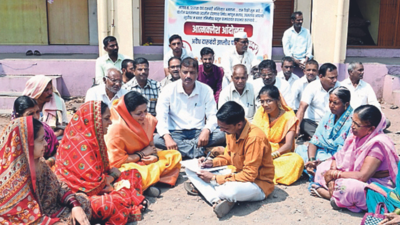Maharashtra’s political landscape has been jolted by the resignation of state minister Dhananjay Munde, following the arrest of his close associate, Walmik Karad, in connection with the brutal murder of village head Santosh Deshmukh in Beed district. Chief Minister Devendra Fadnavis confirmed that he had accepted Munde’s resignation and forwarded it to Governor CP Radhakrishnan for further action.
Santosh Deshmukh, the sarpanch of Massajog village, was abducted and murdered on December 9, 2024. Investigations reveal that Deshmukh was targeted for attempting to thwart an extortion attempt on Avaada Energy, a company operating in the region. His body, bearing signs of severe torture, was discovered abandoned by the roadside, sending shockwaves through the community.
The Crime Investigation Department has arrested seven individuals in connection with the case, with Karad identified as the prime accused. A comprehensive chargesheet exceeding 1,200 pages was submitted to a Beed district court on February 27, detailing the events leading up to Deshmukh’s death and the roles of the accused. The chargesheet also includes graphic videos and photographs captured by the assailants during the crime, underscoring the brutality of the act.
The investigation has uncovered that Deshmukh was abducted, stripped, and subjected to relentless physical assault. The assailants recorded multiple videos and photographs of the torture, some of which depict them forcing Deshmukh to chant demeaning phrases and enduring further humiliation. These recordings have been pivotal in establishing the sequence of events and the involvement of the accused.
Karad’s alleged involvement has had significant political repercussions, leading to mounting pressure on Munde to resign. Discussions between Chief Minister Fadnavis and Deputy Chief Minister Ajit Pawar culminated in the decision for Munde to step down to uphold the integrity of the administration. This development has sparked debates across political circles, with opposition parties demanding accountability and transparency in the investigation.
The charges against the accused include provisions under the Maharashtra Control of Organised Crime Act , reflecting the severity of the crime. The CID’s findings suggest that the murder was orchestrated to eliminate opposition to the extortion racket targeting Avaada Energy. Deshmukh’s resistance to the extortion attempts is believed to have made him a target, leading to his abduction and subsequent murder.
The case has also brought to light the challenges faced by local leaders in rural areas, who often confront threats and violence when opposing criminal activities. Deshmukh’s murder serves as a grim reminder of the risks associated with standing against corruption and extortion in regions where such practices are entrenched.
As the investigation progresses, there are calls for a thorough examination of the nexus between political figures and criminal elements. The resignation of a state minister under such circumstances has intensified scrutiny on the government’s commitment to law and order. Analysts suggest that this incident could lead to broader reforms aimed at curbing the influence of criminal networks within political frameworks.
The Avaada Energy company, at the center of the extortion plot, has expressed deep concern over the incident. In a statement, the company emphasized its commitment to cooperating with law enforcement agencies and ensuring the safety of its employees and associates. The incident has raised alarms within the business community, highlighting the need for robust security measures and the importance of addressing criminal threats that hinder economic development.
Community members in Massajog village have been vocal in their demand for justice. Deshmukh was regarded as a dedicated leader committed to the welfare of his constituents. His untimely death has left a void in the community, with residents organizing vigils and rallies to honor his memory and press for swift justice.
The state government has assured the public of an impartial and thorough investigation. Chief Minister Fadnavis has reiterated his administration’s zero-tolerance policy towards corruption and crime, pledging that those involved, irrespective of their political affiliations, will face the full force of the law.
Legal experts note that the application of MCOCA in this case signifies the authorities’ intent to dismantle organized crime syndicates operating in the region. The act allows for stringent measures, including extended detention periods and stringent bail conditions, aimed at effectively prosecuting individuals involved in organized criminal activities.
The political fallout from Munde’s resignation is expected to influence upcoming electoral strategies. Parties across the spectrum are likely to reassess their candidate selections and affiliations to mitigate potential backlashes arising from associations with individuals implicated in criminal cases. This incident underscores the critical need for political entities to exercise due diligence in vetting their members and associates.
As investigations continue, the focus remains on delivering justice for Santosh Deshmukh and addressing the broader implications of the case. The incident has catalyzed discussions on the imperative of safeguarding public servants and eradicating criminal influences from political and administrative systems.




 Protests Against Bengal Education Minister turn violent
Protests Against Bengal Education Minister turn violent 